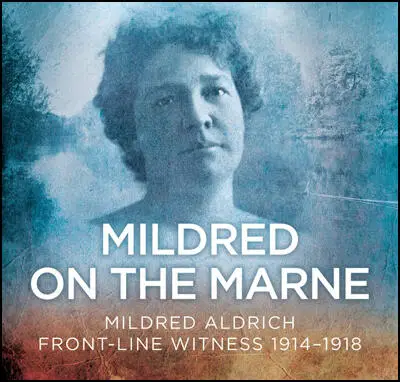On this day on 19th February
On this day in 1861, Alexander II issues his Emancipation Manifesto. This proposed 17 legislative acts that would free the serfs in Russia. Alexander announced that personal serfdom would be abolished and all peasants would be able to buy land from their landlords. The State would advance the the money to the landlords and would recover it from the peasants in 49 annual sums known as redemption payments.
By the end of the 16th century the Russian peasant came under the complete control of the landowner and during the middle of the 17th century serfdom became hereditary. Their situation became comparable to that of slaves and they could be sold to another landowner in families or singly.
By the 19th century it was estimated that about 50 per cent of the 40,000,000 Russian peasants were serfs. Most of these were the property of the nobility but large numbers were owned by the Tsar and religious foundations.
The Crimean War made Alexander II realize that Russia was no longer a great military power. His advisers argued that Russia's serf-based economy could no longer compete with industrialized nations such as Britain and France.
Alexander now began to consider the possibility of bringing an end to serfdom in Russia. The nobility objected to this move but as Alexander told a group of Moscow nobles: "It is better to abolish serfdom from above than to wait for the time when it will begin to abolish itself from below".
Alexander's reforms did not satisfy liberals and radicals who wanted a parliamentary democracy and the freedom of expression that was enjoyed in the United States and most other European states. The reforms in agricultural also disappointed the peasants. In some regions it took peasants nearly 20 years to obtain their land. Many were forced to pay more than the land was worth and others were given inadequate amounts for their needs.
By 1900 around 85 per cent of the Russian people lived in the countryside and earned their living from agriculture. The nobility still owned the best land and the vast majority of peasants lived in extreme poverty.
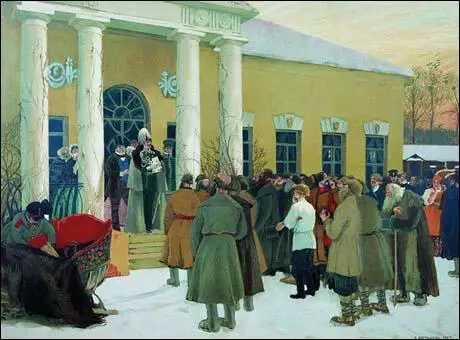
proclamation of the Emancipation Manifesto (1907)
On this day in 1869 Sylvester Williams was born in Trinidad. Williams, one of five children, was born in Trinidad. His father was a wheelwright who had originally come from Barbados. A talented student he qualified as a school teacher in 1886. He took a keen interest in politics and in January 1890 helped establish the Trinidad Elementary Teachers Union.
In 1891 Williams moved to New York where he worked as a public shoe-cleaner. Later he studied law at Dalhousie University in Nova Scotia but left before graduating. In 1896 he travelled to England and entered King's College. To help far for his education Williams he lectured for the Church of England Temperance Society and the National Thrift Society. While in London Williams met and married Agnes Powell, a member of the Temperance Society. Her father, Captain Francis Powell, objected to the wedding and refused to meet Williams. Over the next few years the couple had five children.
Williams became increasingly interested in politics and in 1897 established the African Association. The following year he issued a statement calling for a conference "in order to take steps to influence public opinion on existing proceedings and conditions affecting the welfare of the natives in the various parts of the Empire, viz., South Africa, West Africa and the British West Indies". After a meeting with Booker T. Washington Williams decided to increase the scope of the conference by also looking at "the treatment of native races under European and American rule".
The Pan-African Conference was held at Westminster Town Hall in July 1900. There were 37 delegates from Europe, Africa and the United States. Those attending included Samuel Coleridge Taylor, John Alcindor, Dadabhai Naoroji, John Archer and William Du Bois. At the conference a large number of delegates made speeches where they called for governments to introduce legislation that would ensure racially equality. Michael Creighton, the Bishop of London, asked the British government to confer the "benefits of self-government" on "other races as soon as possible".
Some of the papers delivered at the conference included: The Trials and Tribulations of the Coloured Race in America (Bishop Alexander Walters), Conditions Favouring a High Standard of African Humanity (C. W. French), The Preservation of Racial Equality (Anna Jones), The Necessary Concord to be Established between Native Races and European Colonists (Benito Sylvain), The Negro Problem in America (Anna Cooper), The Progress of our People (John Quinlan) and Africa, the Sphinx of History (D. E. Tobias).
After the conference the Pan-African Congress wrote to Joseph Chamberlain, the British colonial secretary, suggesting that black people in the British Empire should be granted "true civil and political rights". Chamberlain replied that black people were "totally unfit for representative institutions". Williams responded to this by writing to Queen Victoria about the system "whereby black men, women, and children were placed in legalized bondage to white colonists". The letter was passed to Chamberlain who replied that the government would not "overlook the interests and welfare of the native races."
In 1901 Williams travelled the world and managed to set-up branches of the Pan-African Congress in the United States, Jamaica and Trinidad. In October, 1901, Williams established the journal The Pan African. He explained in the first edition that the main objective of the journal was to support the "interests of the African and his descendants in the British Empire". Williams added that in his opinion "that no other but a Negro can represent the Negro".
Membership of the Pan-African Congress remained small. Williams admitted that in 1901 it only had 50 working members. There were also 150 white sympathizers who were admitted to the organization as honorary members.
Williams was called to the bar in June 1902 and therefore became the first barrister of African descent to practise in Britain. Over the next few years he spent a lot of time defending black people involved in the campaign against racial prejudice in South Africa. He also spent time in Liberia, Guinea and Sierra Leone.
Williams joined the Fabian Society and in November 1906 he and John Archer became the first people of African descent to be elected to public office in Britain. Williams won a seat on Marylebone Borough Council whereas Archer won in Battersea.
In 1908 Williams decided to return to Trinidad with his family and soon built a successful legal practice in Port of Spain. He continued to work as a lawyer until his death on 26th March, 1911.
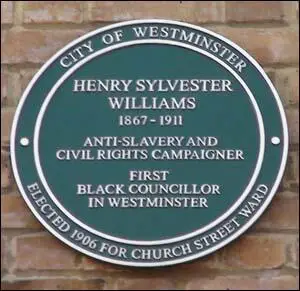
On this day in 1898 Bertolt Brecht was born in Augsburg, Germany. His father was a respected and well-to-do citizen, the managing director of a paper mill, his mother the daughter of a civil servant. "He was a sensitive and taciturn child, non-conformist and rebellious in a quiet, negative way."
Brecht moved to Berlin late in 1924. He became very interested in the work of Erwin Piscator who had recently directed a play, Fahnen, about the Haymarket Bombing by Alfons Paquet. In 1886 several members of the International Working Men's Association were arrested and eventually, were found guilty of an offence they did not commit. Albert Parsons, August Spies, Adolph Fischer, Louis Lingg and George Engel were given the death penalty. Whereas Oscar Neebe, Samuel Fielden and Michael Schwab were sentenced to life imprisonment. Before being sentenced Spies said: "The contemplated murder of eight men, whose only crime is that they have dared to speak the truth, may open the eyes of these suffering millions; may wake them up. Indeed, I have noticed that our conviction has worked miracles in this direction already."
In the play, Piscator provided short sequences of action that were strung episodically together and reviewing the production in the Leipziger Tageblatt, the theatre critic, Alfred Döblin, called the play "a stepping-stone between narrative and drama", adding that this form provided refuge when "the coldness of a writer's feelings stops him from identifying with the characters' fates or the story's development". Three year's earlier, Brecht had made a similar point in his journal when he talked of characters have a "warm heart beating in a cold man." Piscator claimed that "in a certain sense Fahnen represented the first Marxist drama and the production the first attempt at laying bare the materialist motive forces of the action."
In November 1924 Brecht began an affair with Elizabeth Hauptmann, a student of English literature. According to Ronald Hayman, the author Brecht: A Biography (1983): "Blonde, brown-eyed, chubby-cheeked and Saxon, Hauptmann was to become mistress, assistant, and collaborator". Brecht became so dependent on Hauptmann that he persuaded his publisher, Verlag Kiepenheuer, to pay her a salary for helping him with his books and plays.
Hauptmann received a copy of a play written by John Gay, entitled The Beggar's Opera. It had been written in 1728, but Nigel Playfair had revived it successfully in London. Hauptmann translated the play into German and showed it to Brecht. He now decided to transpose the action to make it a play into a bitter satire on the bourgeois society of post-war Germany and offered a socialist critique of the capitalist world. His friend, Kurt Weill, wrote a brilliant musical score, that was based on his love of jazz. Brecht also added four songs by the French poet François Villon.
Songs from the production have been widely covered and become standards, most notably The Ballad of Mack the Knife and Pirate Jenny. Weill later recalled the socialist intentions of the venture: "With the Dreigroschenoper we reach a public which either did not know us at all or thought us incapable of captivating listeners... Opera was founded as an aristocratic form of art... If the framework of opera is unable to withstand the impact of the age, then this framework must be destroyed... In the Dreigroschenoper, reconstruction was possible insofar as here we had a chance of starting from scratch."
The Threepenny Opera (Die Dreigroschenoper, featuring Lotte Lenya, as Jenny, and Carola Neher, as Polly Peachum, opened on 31st August 1928 at Berlin's Theater am Schiffbauerdamm. It was an immediate success and became one of the longest runs in the history of the Berlin theatre, a rare case of a play intended as a work of serious avant-garde art achieving genuine popular success. "His sudden success certainly made Brecht cocky. He began to suspect the motives of critics who failed to join in the general chorus of praise, particularly if they belonged to the left, whom he regarded as natural allies."
In 1938 Brecht began work on the Life of Galileo. The main character is Galileo Galilei, an eminent professor and scientist in the 17th century Venetian Republic. He creates a telescope for careful observations of the Moon and the planets, and he discovers the moons orbiting Jupiter. His observations strongly support the Solar System theory of Nicolaus Copernicus. Galileo furthermore publishes in vernacular Italian, rather than traditional scientific Latin, thus making his work and conclusions more accessible to the common people. Galileo is brought to the Vatican in Rome for interrogation by the Inquisition. Upon being threatened with torture, he recants his teachings. His students are shocked by his surrender in the face of pressure from the church authorities. Galileo is placed under house arrest with a priest monitoring his activities, is visited by one of his former pupils, Andrea. Galileo gives him a book containing all his scientific discoveries, asking him to smuggle it out of Italy for dissemination abroad. Andrea now believes Galileo's actions were heroic and that he just recanted to fool the ecclesiastical authorities. However, Galileo insists his actions had nothing to do with heroism but were merely the result of self-interest.
In the summer of 1939, when war had become inevitable and Denmark appeared more and more unsafe, Brecht moved to Sweden. He now began work on a new play, Mother Courage and Her Children. It was written in two months and was in response to Germany's invasion of Poland. The play is set in the 17th century in Europe during the Thirty Years' War (1618-1648). Anna Fierling (Mother Courage) sells provisions to soldiers involved in the conflict. Over the course of the play, she loses all three of her children, Schweizerkas, Eilif, and Kattrin, to the very war from which she tried to profit. Brecht uses an epic structure to force the audience to focus on the issues rather than getting involved with the characters and their emotions."
In May, 1941, Bertolt Brecht was issued with a visa to enter the United States. Brecht and his family arrived at San Pedro, California, on 21st July, 1941. In the first few months he finished his play, The Resistible Rise of Arturo Ui. It chronicles the rise of Arturo Ui, a fictional 1930s Chicago mobster, and his attempts to control the cauliflower racket by ruthlessly disposing of the opposition. The play is a satirical allegory of the rise of Adolf Hitler and the Nazi Party in Germany during the 1930s. All the characters had direct counterparts in real life, with Arturo Ui (Hitler), his henchman Ernesto Roma (Ernst Röhm), Dogsborough (General Paul von Hindenburg), Emanuele Giri (Hermann Göring), and Giuseppe Givola (Joseph Goebbels). Dramatically Arturo Ui is in keeping with Brecht's 'epic' style of theatre. It opens with a prologue in the form of a direct address, who outlines all the major characters and explains the basis of the upcoming plot. This allows the audience to focus on the message rather being concerned about what might happen next in the plot. It was inspired by the 1940 film, The Great Dictator. Like Charlie Chaplin he wanted to make Hitler ludicrous but he also wanted to expose the social and economic forces that brought him to power.
In 1943, Brecht managed to sell a story based on the assassination of Reinhard Heydrich, the head of Sicherheitsdienst. and the Nazi Reich Protector of German-occupied Prague, and a chief mastermind of the Holocaust. Entitled The Hangman Must Die, the film was directed by an Austrian refugee, Fritz Lang. In Brecht story, Heydrich's killer is depicted as a member of the Czech resistance with ties to the Communist Party. In reality, it was Stewart Menzies, the head of MI6 who gave permission for Colin Gubbins, the director of operations of Special Operations Executive (SOE) to organize the assassination Heydrich. The Czech secret service in England provided British-trained assassination agents Jan Kubis and Jozef Gabčík.
In 1943 Brecht wrote The Caucasian Chalk Circle. "In the story, which is set in Augsburg during the Thirty Years War, a maid, Anna, rescues a baby which has been abandoned. Years later, when its mother claims it, the case is heard by a judge... A chalk circle is drawn on the ground, the child put inside it, and the two women are ordered to pull it out. Anna, who cannot bear to hurt the child, lets the mother yank it out of the circle, but the judge decides in Anna's favour. The idea derives partly from a judgment of King Solomon, who is said to have decided a similar case by offering to cut the disputed child in half, and awarding it to the woman who withdrew her claim... In Brecht's play, the mother deserves to lose her child, which is awarded to a woman who will care for it better. As so often, he is demonstrating that justice has little to do with the law."
In 1945 Erwin Piscator was given permission to direct a play for the off-Broadway group The Theatre of All Nations. He selected The Private Life of the Master Race by Brecht. However, when Brecht arrived from California, he attended the rehearsals and disliked what he saw and tried to have the performance cancelled. On 29th May, a fortnight before the opening at City College, Piscator walked out and refused to direct the play. Brecht called in Berthold Viertel to help him with the production. The critics found the result amateurish, though it is difficult to discover whose fault this was. Brecht told his friend, Leon Askin: "Our ideas on epic theatre are so different, that I preferred to leave him alone."
Bertolt Brecht had great difficulty having his plays produced. A gallant band of anti-Nazi actors based in Zurich had great success with three of the plays he had written in Denmark: Mother Courage and Her Children, Life of Galileo and The Good Person of Setzuan. He had little luck in the United States and it was not until 1945 that Fear and Misery of the Third Reich appeared on the New York stage. On 30th July 1947, Life of Galileo, with Charles Laughton, in the role of Galileo. directed by Joseph Losey, opened at the Coronet Theatre in Beverly Hills.
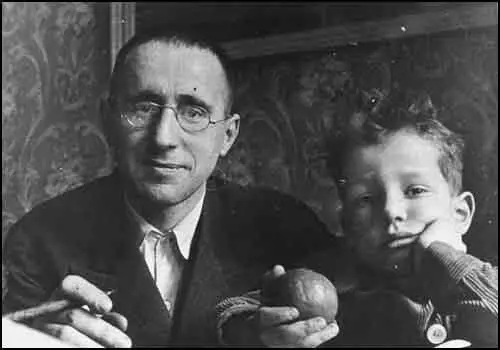
On this day in 1913 Lilian Lenton was arrested after setting fire to the tea pavilion in Kew Gardens . Lenton, a member of the Women's Social and Political Union (WSPU), was one of the young women involved in this arson campaign. Along with Olive Wharry she embarked on a series of terrorist acts. In court it was reported: "The constables gave chase, and just before they caught them each of the women who had separated was seen to throw away a portmanteau. At the station the women gave the names of Lilian Lenton and Olive Wharry. In one of the bags which the women threw away were found a hammer, a saw, a bundle to tow, strongly redolent of paraffin and some paper smelling strongly of tar. The other bag was empty, but it had evidently contained inflammables."
While in custody, Lenton went on hunger strike and was forcibly fed. She was quickly released from prison when she became seriously ill after food entered her lungs. After she recovered she managed to evade recapture until arrested in June 1913 in Doncaster and charged with setting fire to to a railway station at Blaby, Leicestershire. She was held in custody at Armley Prison in Leeds. She immediately went on hunger-strike and was released after a few days under the Cat & Mouse Act. The following month she escaped to France in a private yacht.
According to Elizabeth Crawford, the author of The Suffragette Movement (1999): "Lilian Lenton has stated that her aim was to burn two buildings a week, in order to create such a condition in the country that it would prove impossible to govern without the consent of the governed." Lenton was soon back in England setting fire to buildings but in October 1913 she was arrested at Paddington Station. Once again she went on hunger-strike and was forcibly fed, but once again she was released when she became seriously ill.
Lilian Lenton was released on licence on 15th October. She escaped from the nursing home and was arrested on 22nd December 1913 and charged with setting fire to a house in Cheltenham. After another hunger-and-thirst strike, she was released on 25th December to the care of Mrs Impey in King's Norton. Once again she escaped and evaded the police until early May 1914 when she was arrested in Birkenhead. She was only in prison for a few days before she was released under the Cat & Mouse Act.
On 4th August, 1914, England declared war on Germany. Two days later the NUWSS announced that it was suspending all political activity until the war was over. The leadership of the WSPU began negotiating with the British government. On the 10th August the government announced it was releasing all suffragettes from prison. In return, the WSPU agreed to end their militant activities and help the war effort.
Emmeline Pankhurst announced that all militants had to "fight for their country as they fought for the vote." Ethel Smyth pointed out in her autobiography, Female Pipings for Eden (1933): "Mrs Pankhurst declared that it was now a question of Votes for Women, but of having any country left to vote in. The Suffrage ship was put out of commission for the duration of the war, and the militants began to tackle the common task."
Annie Kenney reported that orders came from Christabel Pankhurst: "The Militants, when the prisoners are released, will fight for their country as they have fought for the Vote." Kenney later wrote: "Mrs. Pankhurst, who was in Paris with Christabel, returned and started a recruiting campaign among the men in the country. This autocratic move was not understood or appreciated by many of our members. They were quite prepared to receive instructions about the Vote, but they were not going to be told what they were to do in a world war."
In 1914 Eveline Haverfield, a member of the WSPU, founded the Women's Emergency Corps, an organisation which helped organize women to become doctors, nurses and motorcycle messengers. Later she was appointed as Commandant in Chief of the Women's Reserve Ambulance Corps, Haverfield was instructed to organize the sending of the Scottish Women's Hospital Units to Serbia. In August, 1916, Lilian Lenton went with Haverfield, Dr. Else Inglis, Elsie Bowerman, and Vera Holme to the Balkan Front.
Haverfield was appointed head of the transport column and in August 1916 she was dispatched to Russia. Her biographer, Elizabeth Crawford, has commented: "Haverfield sailed for Russia, in charge of the unit's transport column, which comprised seventy-five women noted for their smart uniforms and shorn locks. She herself is invariably described as being small, neat, and aristocratic, able to command devotion from her troops, although some of her peers, not so enamoured, were scathing of her ability."
On 28th March, 1917, the House of Commons voted 341 to 62 that women over the age of 30 who were householders, the wives of householders, occupiers of property with an annual rent of £5 or graduates of British universities. After the passing of the Qualification of Women Act the first opportunity for women to vote was in the General Election in December, 1918. Several of the women involved in the suffrage campaign stood for Parliament. Only one, Constance Markiewicz, standing for Sinn Fein, was elected. Lenton later recalled: "Personally, I didn't vote for a long time, because I hadn't either a husband or furniture, although I was over 30."
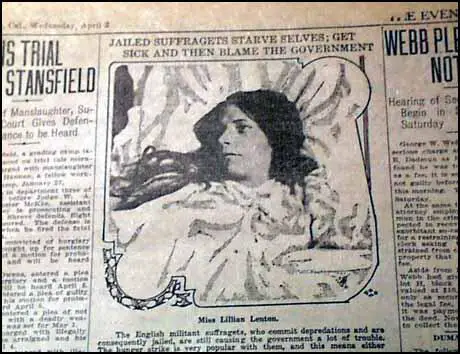
On this day in 1915, Vice Admiral Sackville Carden began his attack on the Dardanelles Forts. The assault started with a long range bombardment followed by heavy fire at closer range. As a result of the bombardment the outer forts were abandoned by the Turks. The minesweepers were brought forward and managed to penetrate six miles inside the straits and clear the area of mines. Further advance up into the straits was now impossible. The Turkish forts were too far away to be silenced by the Allied ships. The minesweepers were sent forward to clear the next section but they were forced to retreat when they came under heavy fire from the Turkish batteries.
Winston Churchill became impatient about the slow progress that Carden was making and demanded to know when the third stage of the plan was to begin. Admiral Carden found the strain of making this decision extremely stressful and began to have difficulty sleeping. On 15th March, Carden's doctor reported that the commander was on the verge of a nervous breakdown. Carden was sent home and replaced by Vice-Admiral John de Robeck, who immediately ordered the Allied fleet to advance up the Dardanelles Straits. Reginald Brett, who worked for the War Council, commented: "Winston is very excited and jumpy about the Dardanelles; he says he will be ruined if the attack fails."
On 18th March eighteen battleships entered the straits. At first they made good progress until the French ship, Bouvet struck a mine, heeled over, capsized and disappeared in a cloud of smoke. Soon afterwards two more ships, Irresistible and Ocean hit mines. Most of the men in these two ships were rescued but by the time the Allied fleet retreated, over 700 men had been killed. Overall, three ships had been sunk and three more had been severely damaged. Altogether about a third of the force was either sunk or disabled.
At an Admiralty meeting on 19th March, Churchill and Fisher agreed that losses were only to be expected and that four more ships should be sent out to reinforce De Robeck, who responded with the news that he was reorganising his force so that some of the destroyers could act as minesweepers. Churchill now told Asquith that he was still confident that the operation would be successful and was "fairly pleased" with the situation.
On 10th March, Lord Kitchener finally agreed that he was willing to send troops to the eastern Mediterranean to support any naval breakthrough. Churchill was able to secure the appointment of his old friend, General Ian Hamilton, as Commander of the British Forces. At a conference on 22nd March on board his flagship, Queen Elizabeth, it was decided that soldiers would be used to capture the Gallipoli peninsula. Churchill ordered De Roebuck to make another attempt to destroy the forts. He rejected the idea and said that the idea that the forts could be destroyed by gunfire had "conclusively proved to be wrong". Admiral Fisher agreed and warned Churchill: "You are just eaten up with the Dardanelles and can't think of anything else! Damn the Dardanelles! they'll be our grave."
Arthur Balfour suggested delaying the landings. Winston Churchill replied: "No other operation in this part of the world could ever cloak the defeat of abandoning the effort at the Dardanelles. I think there is nothing for it but to go through with the business, and I do not at all regret that this should be so. No one can count with certainty upon the issue of a battle. But here we have the chances in our favour, and play for vital gains with non-vital stakes." He wrote to his brother, Major Jack Churchill, who was one of those soldiers about to take part in the operation: "This is the hour in the world's history for a fine feat of arms, and the results of victory will amply justify the price. I wish I were with you."
Asquith, Kitchener, Churchill and Hankey held a meeting on 30th March and agreed to go ahead with an amphibious landing. Leaders of the Greek Army informed Kitchener that he would need 150,000 men to take Gallipoli. Kitchener rejected the advice and concluded that only half that number was needed. Kitchener sent the experienced British 29th Division to join the troops from Australia, New Zealand and French colonial troops on Lemnos. Information soon reached the Turkish commander, Liman von Sanders, about the arrival of the 70,000 troops on the island. Sanders knew an attack was imminent and he began positioning his 84,000 troops along the coast where he expected the landings to take place.
The attack that began on the 25th April, 1915 established two beachheads at Helles and Gaba Tepe. Another major landing took place at Sulva Bay on 6th August. By this time they arrived the Turkish strength in the region had also risen to fifteen divisions. Attempts to sweep across the peninsula by Allied forces ended in failure. By the end of August the Allies had lost over 40,000 men. General Ian Hamilton asked for 95,000 more men, but although supported by Churchill, Lord Kitchener was unwilling to send more troops to the area.
In the words of one historian, "In the annals of British military incompetence Gallipoli ranks very high indeed." Churchill was blamed for the failed operation and Asquith told him he would have to be moved from his current post. Asquith was also involved in developing a coalition government. The Conservative leader, Andrew Bonar Law, became Minister of the Colonies and Churchill's long-term enemy, Arthur Balfour, became the new First Lord of the Admiralty. Churchill was now relegated to the post of the Chancellorship of the Duchy of Lancaster.
On 14th October, Hamilton was replaced by General Charles Munro. After touring all three fronts Munro recommended withdrawal. Lord Kitchener, initially rejected the suggestion but after arriving on 9th November 1915 he visited the Allied lines in Greek Macedonia, where reinforcements were badly needed. On 17th November, Kitchener agreed that the 105,000 men should be evacuated and put Monro in control as Commander-in-Chief Mediterranean.
About 480,000 Allied troops took part in the Gallipoli Campaign, including substantial British, French, Senegalese, Australian, New Zealand and Indian troops. The British had 205,000 casualties (43,000 killed). There were more than 33,600 ANZAC losses (over one-third killed) and 47,000 French casualties (5,000 killed). Turkish casualties are estimated at 250,000 (65,000 killed). "The campaign is generally regarded as an example of British drift and tactical ineptitude."
In November, 1915, Winston Churchill was removed as a member of the War Council. He now resigned as a minister and he told Asquith that his reputation would rise again when the whole story of the Dardanelles came out. He also criticised Asquith in the way the war had so far been managed. He ended his letter with the words: "Nor do I feel in times like these able to remain in well-paid inactivity. I therefore ask you to submit my resignation to the King. I am an officer, and I place myself unreservedly at the disposal of the military authorities, observing that my regiment is in France."
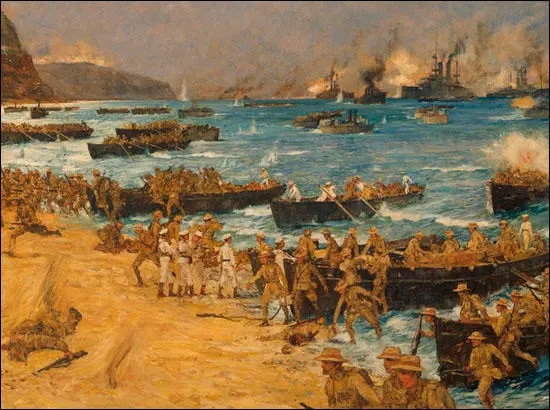
On this day in 1928 feminist writer Mildred Aldrich died. Mildred was born in Providence, Rhode Island, in 1853. After graduating from Everett High School in 1872 she taught elementary school in Boston, Massachusetts.
Aldrich began her career as a journalist with the Boston Home Journal and later contributed to Arena, and the Boston Herald. For a short period in 1892 she also edited the magazine, The Mahogany Tree.
In 1898 Aldrich moved to France and while living in Paris became a close friend of Gertrude Stein. Aldrich worked as a foreign correspondent and newspaper critic until retiring to Huiry, a village on the outskirts of Paris. She wrote to Stein in June 1914: "It will be the bloodiest affair the world has ever seen - a war in the air, under the sea as well as on it, and carried out with the most effective man-slaughtering machines ever used in battle."
During the First World War Aldrich wrote A Hilltop on the Marne (1915), a book based on her journal entries (3rd June - 8th September 1914) and on letters she wrote to Gertrude Stein. The book sold well in the United States and she followed it with On the Edge of the War Zone (1917), The Peak of the Load (1918) and When Johnny Comes Marching Home (1919).
The French government believed that Aldrich's work helped persuade the US government to declare war on Germany and in 1922 was awarded the Legion of Honour.
